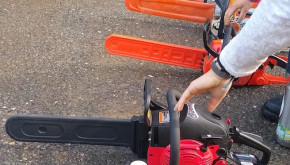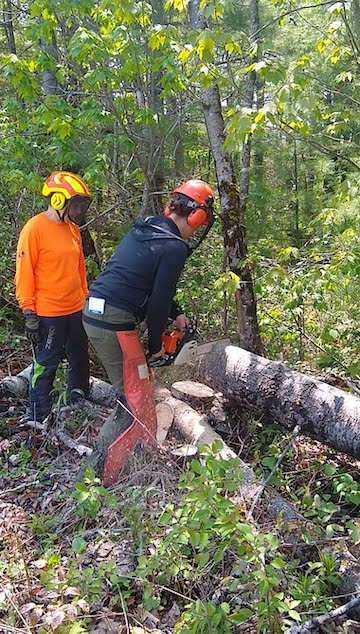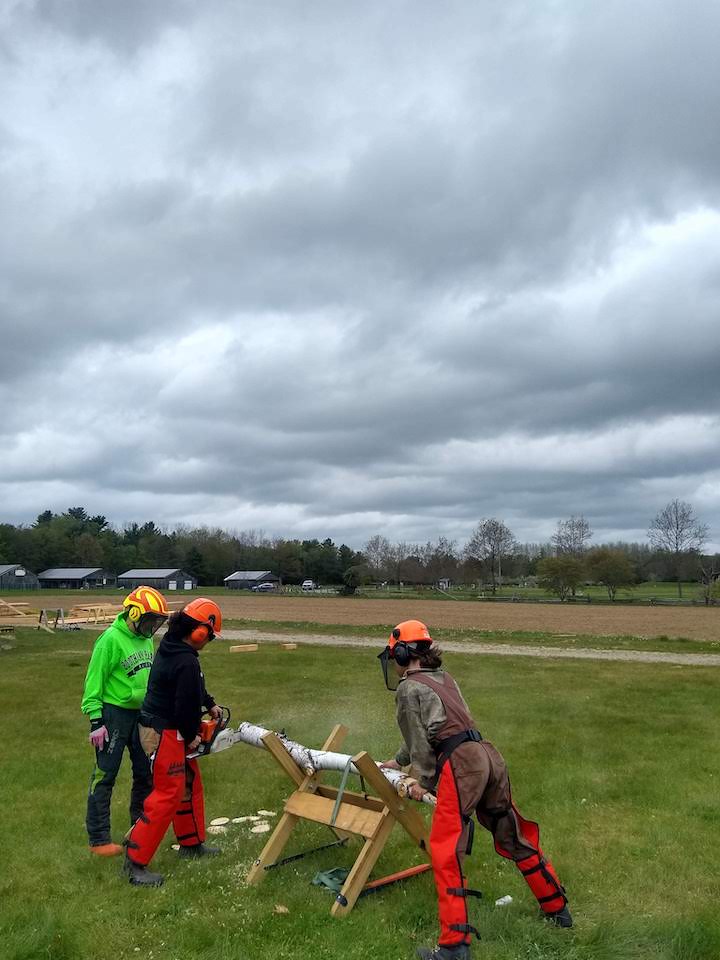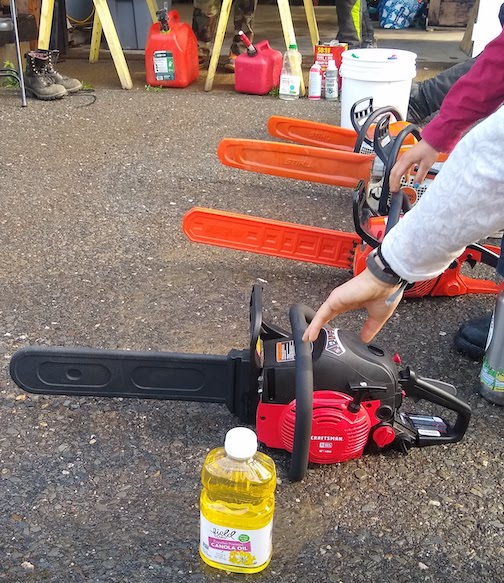
By Dani Walczak
I bought my first pair of steel-toed boots for MOFGA’s femme, nonbinary, trans and women (FNTW) chainsaw safety course.
“You know these are steel-toed,” the cashier said to me. “Yes I know,” I replied. “Well, what do you do for work?” she asked, surprised.
Tasks involving machinery, heavy-lifting and sharp objects often require steel-toed boots — and such spaces are stereotypically reserved for cis men. The sentiment from the cashier runs deep: People who look like me don’t use chainsaws.
As a queer person, I’ve manipulated my appearance and style to be taken seriously in male-dominated manual labor spaces. I’ve lied about my experience and worked twice as hard, and late, so I could gain acceptance — and paychecks — in a space I didn’t feel welcome even with the privileges of a tall, able-bodied, white person.

at MOFGA’s FNTW Chainsaw Safety Course. Dana Peirce photo
Later that day, the cashier’s question still in my mind, I responded to a pre-class survey for the course:
Experience level: none
What do I want to learn from class: chainsaw safety, how to fell a tree, how to clear brush.
However, this is how I wanted to respond to that question on the form: How do I learn a skillset in a culture dominated by competition and brute force, and still be myself? How do I find community in a culture I and my BIPOC and trans friends are not welcomed in even if we can perform a certain skillset? How do we create our own community in forestry?
MOFGA’s class, held outside in Unity at the Common Ground Education Center, offered a framework to begin answering these questions.
MOFGA has offered chainsaw safety courses since 2002 and began hosting women’s chainsaw safety classes in 2020 before switching to FNTW classes in 2022 — I attended the second of these classes on May 20 and 21, 2023.
The class instructors were tish carr (she/her) and Luca Mellon (they/them). Tim Libby (he/him) joined the second day as the third instructor — courses have a 5-to-1 student to instructor ratio.
This class is about “the thoughtful use of tools for stewarding the forest, not for profit,” carr said to introduce the two-day workshop.
The reason folks attended is foundational to building safe group dynamics, and we all shared our intentions. One participant, Kenya, had different priorities than her partner in maintaining the grounds at the artist retreat where they work. Another, Heidi, wanted to connect with other women to work with in the woods. Marissa said, “I wanted to take this class after spending time in a male-dominated field and being afraid of doing it wrong. I want to learn in a community, with a femme or queer touch that feels antithetical to patriarchy.”
Asking questions would be essential to all of us learning. “It might even be unsafe to not ask that question,” Mellon added.
The class was split into sections: personal safety, chainsaw safety and repair, field use (with the most helpful two-cycle engine demo I’ve had), and field work — cutting “cookies” (or discs) off the length of a downed tree, felling a tree, conducting bore cuts and clearing brush.
Although I lament not learning a mechanical skillset from a young age, carr was quick to point out the benefits of learning correctly the first time.
This reframing was woven throughout the class. Each time I or one of my classmates fell back on ways people with less power are socialized, such as apologizing for not getting it right, second-guessing themselves, or competing and comparing, our insecurities were quickly and smoothly reframed to be supportive and confidence-building.
“The way you did it was ok, what about this way?” Mellon would say. Or, “The way you did it is a great learning opportunity — good idea.”

need your attention?” Dani Walczak photo
Classmates cheered each other on, clapped, patted each other on the shoulder, and reminded each other to put on personal protective equipment (PPE).
Mellon would occasionally mention to us it isn’t about who can cut the thinnest cookie but about each of us developing a relationship with how wood feels and responds under the blade of a chainsaw.
“It’s so gentle,” Kenya commented to me over the blare of one of our classmates touching chainsaw to wood.
And indeed it was. Throughout the length of the course I felt comfortable, not because I was ignoring the inherent danger of using machinery with a blade that moves at 60 mph, but because I felt equipped by Mellon and carr to address challenges as they arise, to make sure my body and the bodies of others were safe, to ask questions, observe and learn from my surroundings — skills that extend far beyond the scope of chainsaws.
The safety lesson focused on advances in chainsaws like the brake and chain guard, as well as the best ways to keep our bodies safe while using a chainsaw: well-fitting PPE, body position and minimizing bodily distractions were all covered.

to follow along. Walczak photo
“It is ok to stop, realizing that you might be too tired to continue safely. And that is ok,” carr explained.
“Your safety practices do affect the people around you,” Mellon added.
The class emphasized knowing your body and its needs and communicating them as both a component of personal and group safety.
Towards the end of day one, before we first wielded chainsaws and started cutting cookies, I watched a feeling of community emerge in our class during a brief discussion about macho work culture and what there is to do about it.
This was my favorite part of the weekend.
Many in the class were familiar with macho work culture: a culture without personal boundaries, one about competition and strength. One where people say: “This is how we do it here” or “You don’t need to do that safety requirement.”
The discussion turned to the importance of boundaries in these prevalent spaces.
“You have every right to say, ‘This is not best practice,’” carr said. “If the standard of safety we’re encouraging in this class isn’t the standard of safety on your worksite, it doesn’t mean everyone is ok with it.”
Mellon explained, with our new chainsaw skillset, we’ll likely go into spaces — at work, at a chainsaw shop or at the gas station trying to get two-cycle engine oil — “where the culture shift hasn’t happened yet.” They added, “But this class is a start and you can bring those boundaries and knowledge about safety with you.”
Trying to exist as a FNTW person in manual labor spaces, my default has often been to replicate the behavior of cis men around me to minimize my differences and lay low, but what if FNTW folks’ existence in spaces like the chainsaw world co-created an entirely new dynamic with different priorities around community, safety and stewardship?
My fellow classmates and our instructors show that’s possible. The trees and ecosystems of the forest we worked in reflected ideas of cooperation back to us. Birds fed on insects flying between young maple trees growing from soil covered in desiccated leaves from the much older trees around them — the community nourishing itself.
Our class ended with many participants requesting a FNTW chainsaw level two course. carr sent us off with a vote of encouragement. “Don’t short-change yourself,” she said. “Trust what you learned here is the right way.”
About the author: Dani Walczak is a farmworker-turned-gardener living in Portland, Maine. She writes about farming and cooks meals for the unsheltered population of Southern Maine with Preble Street.

